Read in this interview:
The concept that Central Europe should not be a firm part of the West is dangerous.
Some Slovak companies have the potential to make it on the American market.
The Slovak Spectator (TSS): Slovak PM Peter Pellegrini met with US President Donald Trump in the White House in early May. What was the main outcome of this visit from your perspective?The Slovak Spectator (TSS): Slovak PM Peter Pellegrini met with US President Donald Trump in the White House in early May. What was the main outcome of this visit from your perspective?
Ivan Korčok
took up the post of the Slovak Ambassador to the US in September 2018, after a three-year posting as the State Secretary at the Foreign Affairs Ministry.
During his diplomatic career, Korčok also served as ambassador to Germany and to the EU.
In 2003, he headed the Slovak delegation during the accession talks to NATO.
In September 2018, Korčok received the Czech and Slovak Transatlantic Award on the sidelines of the NATO Days in Ostrava, “for his many years of effort to support transatlantic relations”.
Ivan Korčok (IK): A visit to the White House always serves to review mutual relations. It also sends a message from the top political level about what we want to do in the future. In the unstable atmosphere of today, confirming the strategic alliance between Slovakia and the US is the most important outcome for me. Clarity about this is a good foundation for other areas – politics, economic relations and defence cooperation. Moreover, it was a very open talk at a time when we see tension in transatlantic relations and differing opinions on many foreign policy issues.
TSS: Since the visit, there have been rumours that President Trump might visit Slovakia this year. Do you see the possibility of this happening? What is the significance of such a top-level visit to Slovakia?
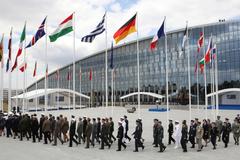
IK: What kind of visit would it be without rumours... But, to speak seriously, the invitation has been extended. We have been in touch with the White House. In the US, everything will soon revolve around next year’s presidential election. That will be a decisive factor in planning the foreign visits made by President Donald Trump until the end of his current term.
TSS: One of the main issues discussed between Slovak and American partners is defence cooperation. Slovakia has been criticised for failing to meet its commitment to spend 2 percent GDP on defence as a NATO member. Have you personally faced this or similar criticism as ambassador in the US?
IK: Defence spending is an important issue for President Trump. He left no doubt that the European allies must do more for the common defence and this must also be translated into their spending. The 2-percent GDP is our own commitment. We took it upon ourselves deliberately. Slovakia is one of the countries that have significantly increased their credibility. Here in the US, we are numbered among the group of countries that are seen positively regarding their efforts to achieve the 2-percent GDP goal. Obviously, whether the expenditure is sustainable in the long run and how it transforms into concrete military capabilities will remain a highly topical issue.
TSS: The current government has been sending confusing signals about foreign policy, there is a visible disagreement about attitudes to Russia and to Slovakia’s pro-western alliances within the coalition. Are we seen as a reliable partner for the US and for our other NATO allies?
IK: Every partner, including the US and Slovakia, cautiously observe what is going on in individual countries, even more so since we are NATO allies. Having the NATO guarantee for our own defence through Article 5 is a significant matter, not a banal thing at all. Deeds are decisive, of course, but in international politics, words do matter as well. That is also why the US has been closely following political discussions about the Defence Agreement in Slovakia. The context of our own debate became very obvious when Hungary concluded a practically identical deal and thus took a clear stance on the sensitive issue of sovereignty. If nothing else, then at least this is a reason why it is in Slovakia’s interest not to have a different level of cooperation with the US than our neighbours have. But, it is clear that the answer is at home, on the political rather than the diplomatic table.

TSS: Some have blamed the previous American administration for neglecting Central Europe. Was that really the case? How do you feel about the American attitude to our region now?
IK: “Blame” is not an accurate word here. The US as a superpower also faces the question of where to concentrate their capacities. From the American perspective, Central Europe has been an example of successful integration and transformation and that was the goal when the US strongly engaged in our region in the 1990s. In recent years, however, it turns out that other powers have their interests in Central Europe too. Some would like to overturn the developments made so far and see Central Europe in the “middle”, not just geographically but also politically. This concept, that Central Europe should not be a firm part of the West, is dangerous. That is why I see the motivation for the US to reengage here more. The US has invested a lot in our region politically, and a phase was reached now where they recognise that they need to take care of that investment.
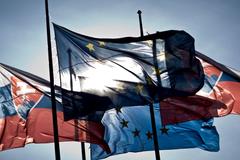
TSS: The current American administration halted the Transatlantic Trade and Investment Partnership (TTIP) talks in late 2016. How did this affect Slovak businesses wishing to have a presence on the American market?
IK: I personally see TTIP as a lost opportunity, but the fact is that it was politically impassable on both sides. The EU and the US are still looking for a model to arrange their trade relations. We face a complicated situation. Economic growth has slowed down in Europe and in China. Investors and businesspeople do not like global economic insecurity. The trade confrontation between the US and China adds to that insecurity significantly, as does the constant threat from the US to introduce more custom duties towards the EU. That is not good.

On the other hand, trade between Slovakia and the US has been paradoxically on the rise, last year it grew by 25 percent, and American investments in production and R&D in Slovakia are growing too. We also see a boom in American investments in shared service centres in Slovakia. IBM with some 6,500 employees and AT&T with some 4,300 are among the biggest investors in Slovakia. Dell has grown from a small call centre into a global financial corporate headquarters. Amazon has one of its world’s biggest and technologically most advanced reverse logistics centres in Slovakia. We also see increased interest and success in Slovak companies establishing themselves on the US market.
TSS: Where do you see room for Slovaks to invest in the US?
IK: Given the size of the Slovak economy and the foreign trade priorities, our investment relations are very asymmetric. In Slovakia, there are 400 companies with American capital, directly or indirectly creating some 45,000 jobs. In contrast, Slovak companies do not have comparable presence on the American market. Nowadays, however, we are seeing a gradual change, Slovak companies are ever more ambitious and self-confident and some have the potential to make it on the highly competitive American market. ESET has been successful, now other companies are coming to the US, mainly courageous and creative start-ups. The US offers a chance for unique, technologically demanding, innovative products and solutions. Joint research and technology projects have big potential too, as seen from the example of the Tachyum company developing microchips. It has two seats now, one in California and one in Slovakia, and early this year it received a loan from the Slovak government of €15 million for building an R&D centre in Slovakia. Several interesting projects in the energy sector and in electromobility are underway, from batteries to the virtual storage of energy, like the partnership of the Slovak InoBat and the American Wildcat Discovery companies.
TSS: What do you do to support efforts of Slovak businesses to gain a presence on the American market?
IK: We try to tailor solutions for companies. We have active cooperation with the Slovak-American Foundation, SBA, SARIO, the active Slovak diaspora in the US, mainly in New York, and other agencies. In February, I supported Slovak start-ups in the prestigious Cambridge Innovation Center in Boston, where they presented their products in front of a jury consisting of successful American start-ups and investors. Their projects included a holiday platform and an app serving the conference industry, blockchain, e-shop tools, virtual medicine platforms and a revolutionary ice-hockey tape. In May, four Slovak start-ups attended Smart Cities New York City to discuss smart solutions in waste management, energy, urban planning and housing. At the same time, the unique Slovak project, Ecocapsule, was displayed in Times Square and attracted a lot of media attention. This autumn we are planning several interesting projects: a roadshow of Slovak innovative companies to Detroit and Dallas, with the aim to promote their solutions for American corporations, a tourism roadshow of the V4 countries on the west coast and the US-Central European Women in Business Summit in New York, that will feature successful Slovak businesswomen and start-up founders.
TSS: The Slovak Embassy in Washington will pay tribute to Milan Rastislav Štefánik and unveil his memorial. Why did you initiate this?

IK: I do not think it is just an empty phrase that today, under the pressure of what happens tomorrow, it does make sense to look back at our own history. Slovakia is now established in the world; 25 years of independence gave us a chance to express ourselves and say who we are and what values we share. We have passed this phase quite successfully. But it is still important to stress that our statehood is rooted in the common European history that we were part of long before Czechoslovakia broke up. Who else than our own personalities should we look to when we talk about our history? Štefánik is a logical choice. That was why, when I visited the Czech and Slovak National Museum and Library in Cedar Rapids, it immediately became clear to me that Slovakia needs to leave a stronger mark here. I am glad that the bust will be unveiled in November and we will thus commemorate him in the year of the 100th anniversary of his death.
TSS: What are the possibilities for Slovak artists and writers to address the American audience? As Slovak ambassador, what are the elements of contemporary Slovak culture that you wish to share with Americans?
IK: Culture is the most important means of our presentation abroad. There is nothing more authentic or more Slovak that we have available. Art is an emotion, it addresses wide audiences, and through art we talk to the world we belong to. Our activities here in the US can be seen as divided into two parts. The first is the traditional cultural diplomacy such as concerts and exhibitions at embassies. I am rather sceptical about whether this is the way to put our artists on the real market, which is what our cultural diplomacy should be aiming for. What matters to me is to present the art mainly to the Americans, not primarily to the diplomats. The relevant reference comes from the galleries and catalogues our artists are part of. I don’t need to stress how complicated it is to achieve such placement in the US. But we do have positive examples like Štefan Papčo, Juraj Kollár, Roman Ondák, Vladimír Ossif or Lucia Sceranková.
I also know that the Zahorian & Van Espen gallery is trying to get our art onto the US market. But this is a long-term project, and there is the question of money. Another way is to get our art into public institutions, foundations and private collections and we should explore opportunities for cooperation e.g. with such institutions as Slovak National Gallery or Kunsthalle. It seems to me that as it is logical and right to invest in supporting start-ups, we should also invest in the support of art abroad, because it creates goodwill of our country, which in the end has an economic dimension too.
TSS: You have now lived in the US for a year. What do you like about Americans? How could they inspire Slovaks?
IK: I have been to the US many times before my current Washington posting. Even so, one year seems a very short time to get to know this diverse, huge country and understand it. It is clear that this country faces similar problems to those of the whole western world. The most interesting moments for me, other than the opportunity to observe international politics at its epicentre and from diplomatic bubble, are the private trips that allow you to literally touch the country. I am not a big fan of attaching stereotypes and generalised characteristics to nations. One thing, however, I would mention about Americans, though, is their optimism, their determination to cope with life. I also value their willingness to help. I feel like people in the street are happy to advise you when you need to find your way. Sometimes I can’t believe my eyes when I see police officers, really tough guys, helping to change a wheel or start an engine. Not that I am making suggestions for our police corps…


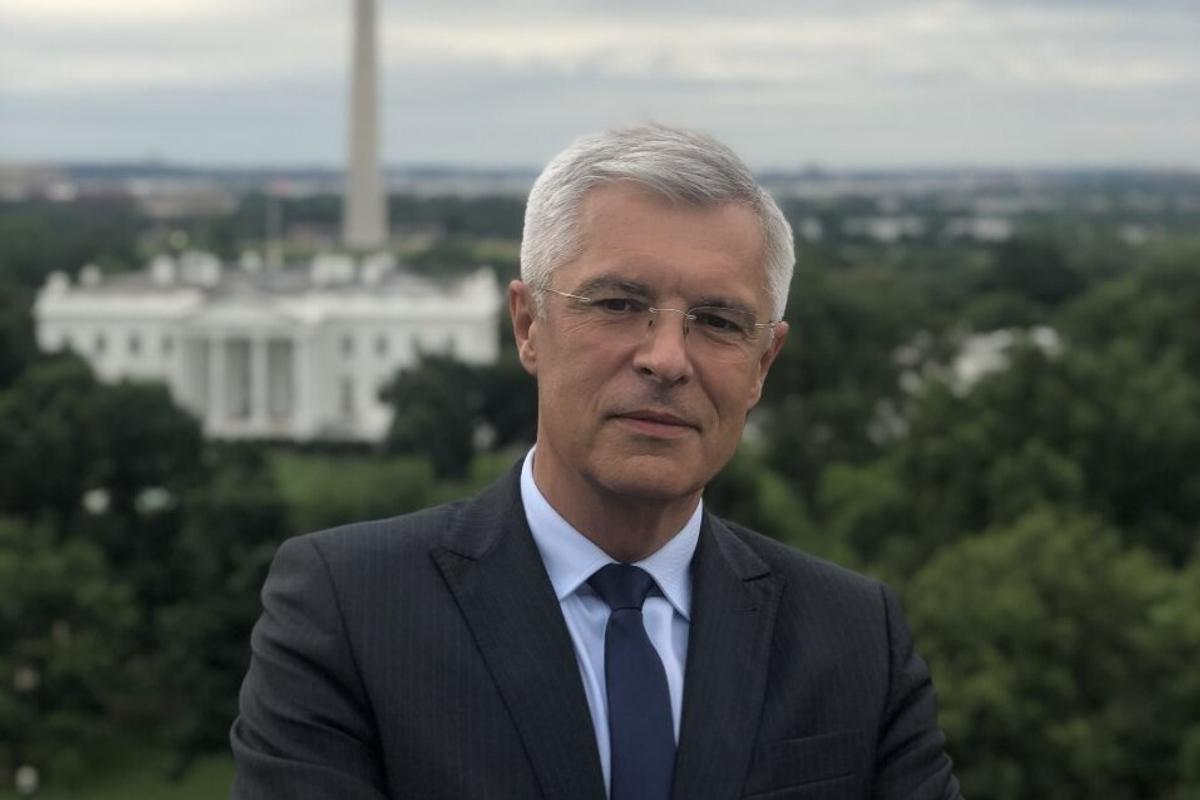 Ivan Korčok in Washington. (source: Courtesy of I.K.)
Ivan Korčok in Washington. (source: Courtesy of I.K.)
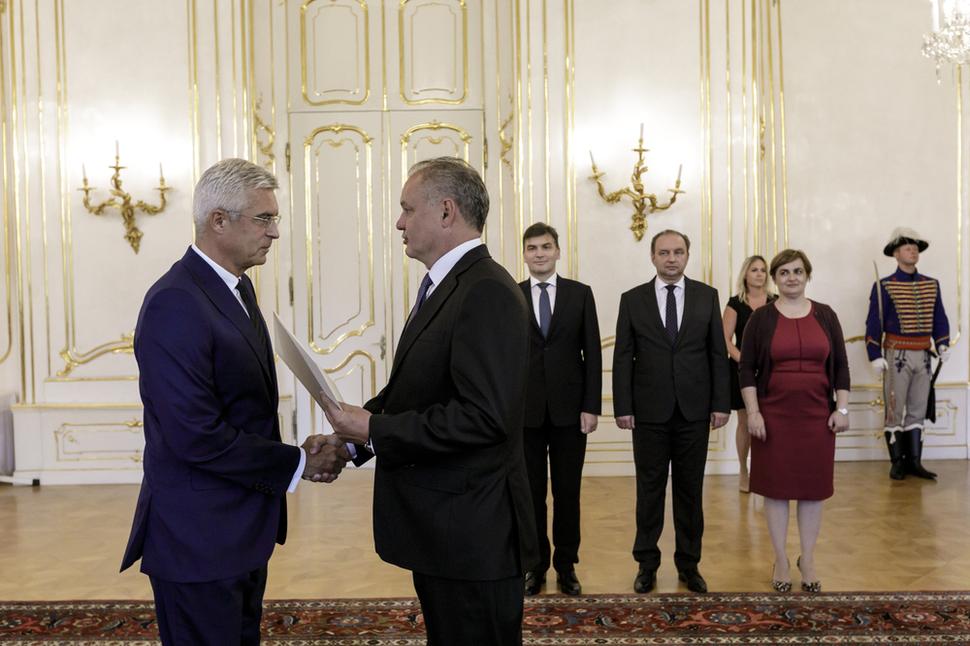 Ivan Korčok receives credentials as Slovakia's Ambassador to the US from President Andrej Kiska in 2018. (source: TASR)
Ivan Korčok receives credentials as Slovakia's Ambassador to the US from President Andrej Kiska in 2018. (source: TASR)
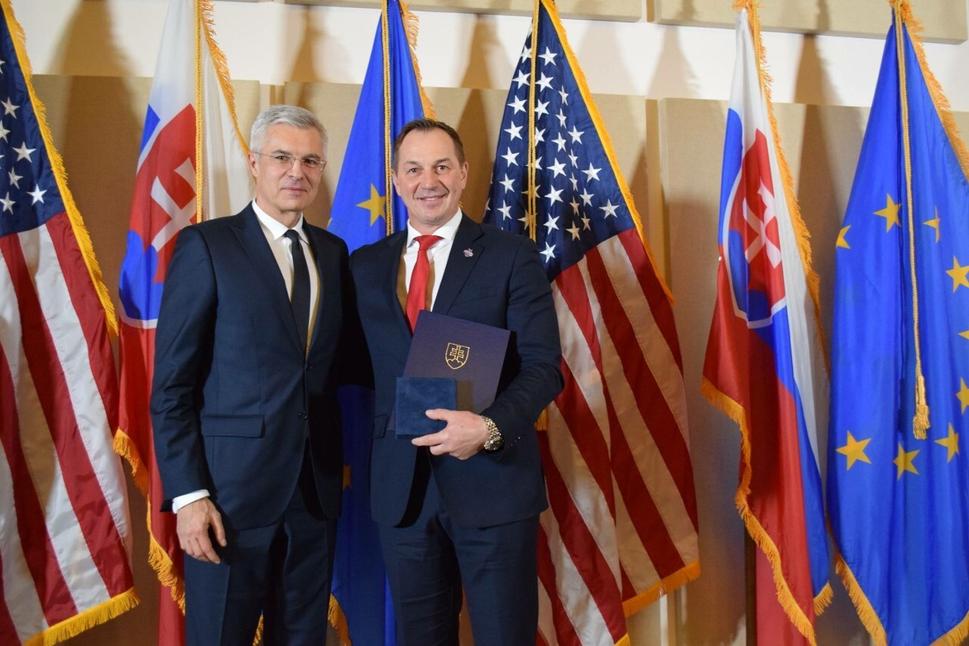 Slovak Ambassador Ivan Korčok handing the Woodrow Wilson award to former ice-hockey star Peter Bondra. (source: Courtesy of I.K.)
Slovak Ambassador Ivan Korčok handing the Woodrow Wilson award to former ice-hockey star Peter Bondra. (source: Courtesy of I.K.)
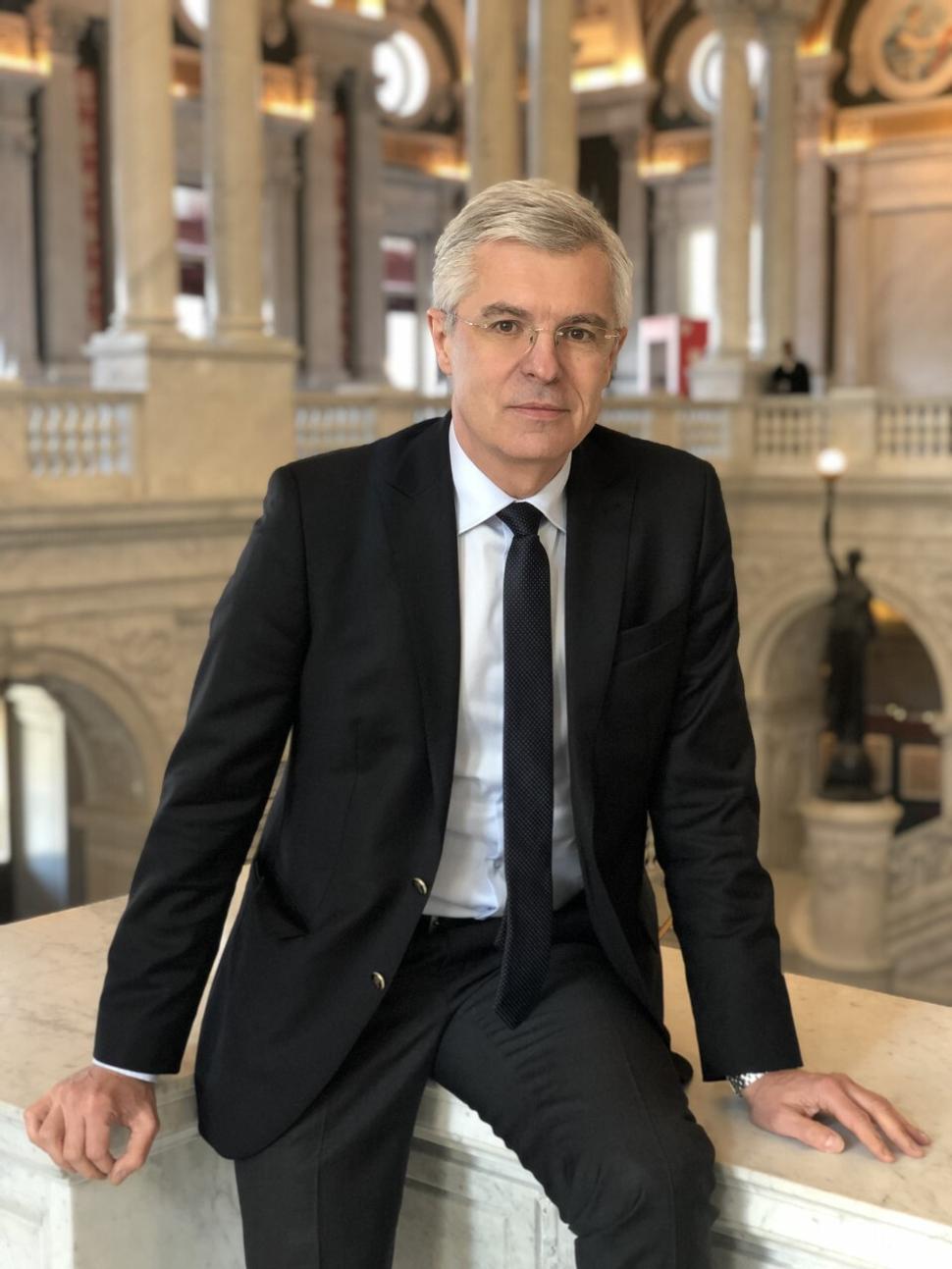 Ivan Korčok in the US Congress (source: Courtesy of I.K.)
Ivan Korčok in the US Congress (source: Courtesy of I.K.)